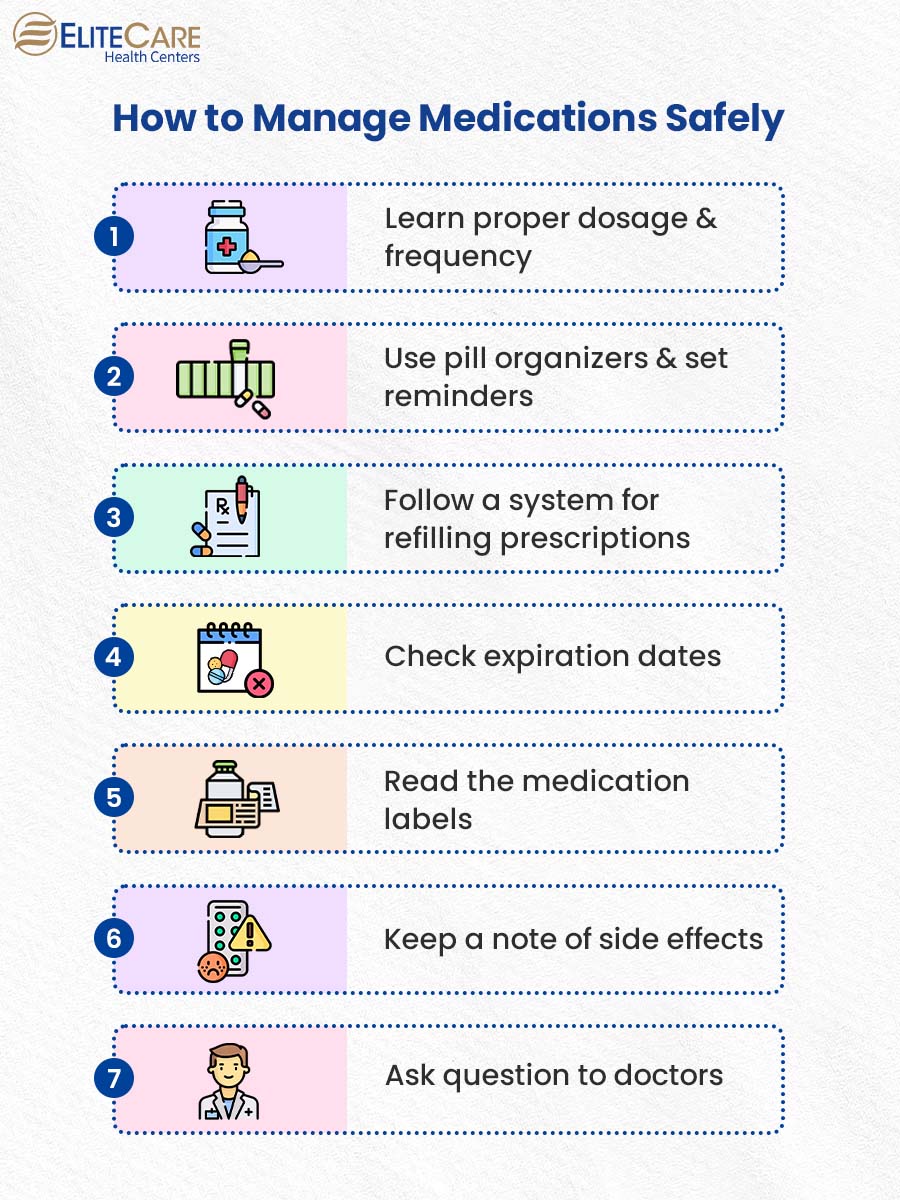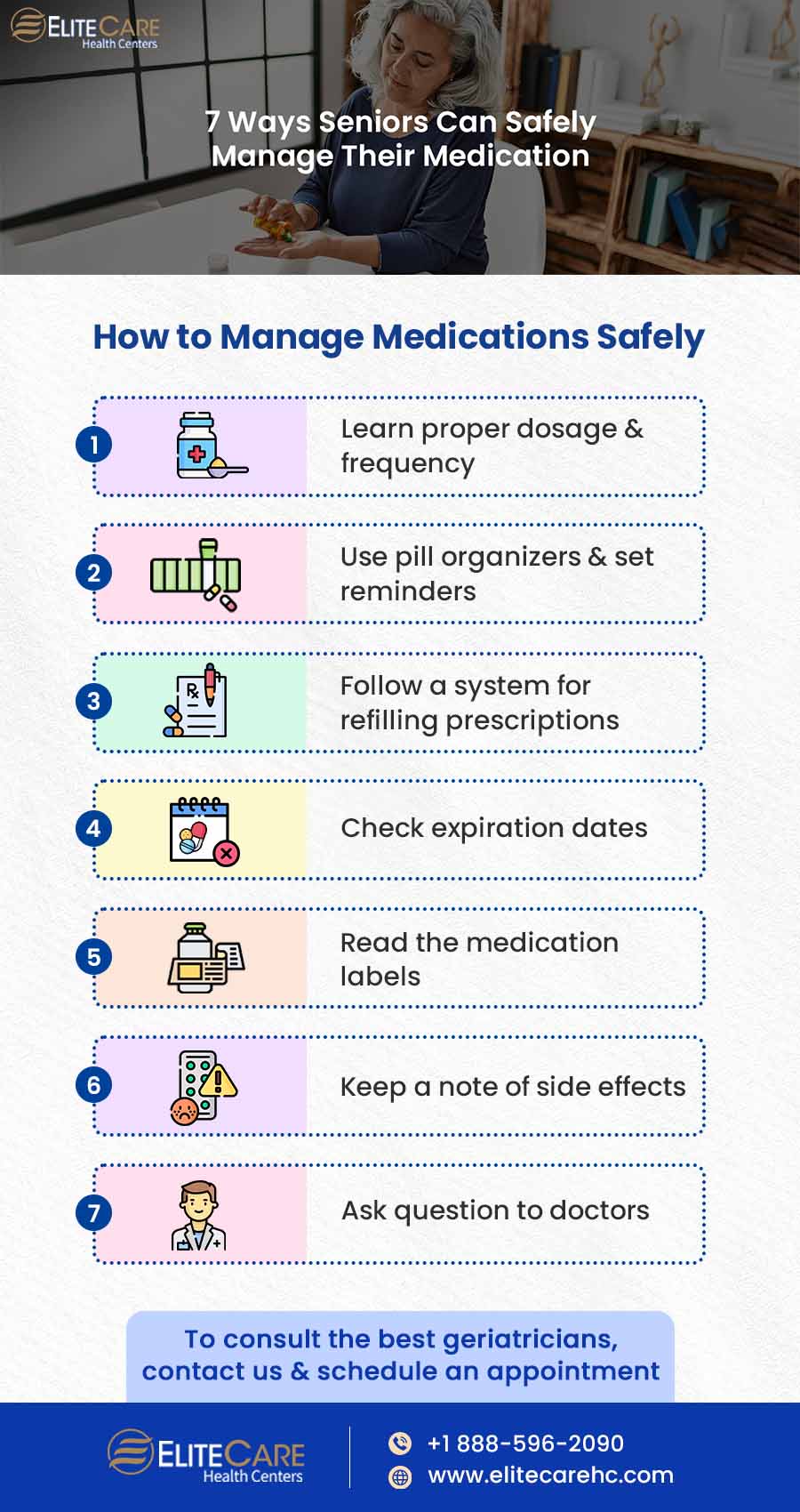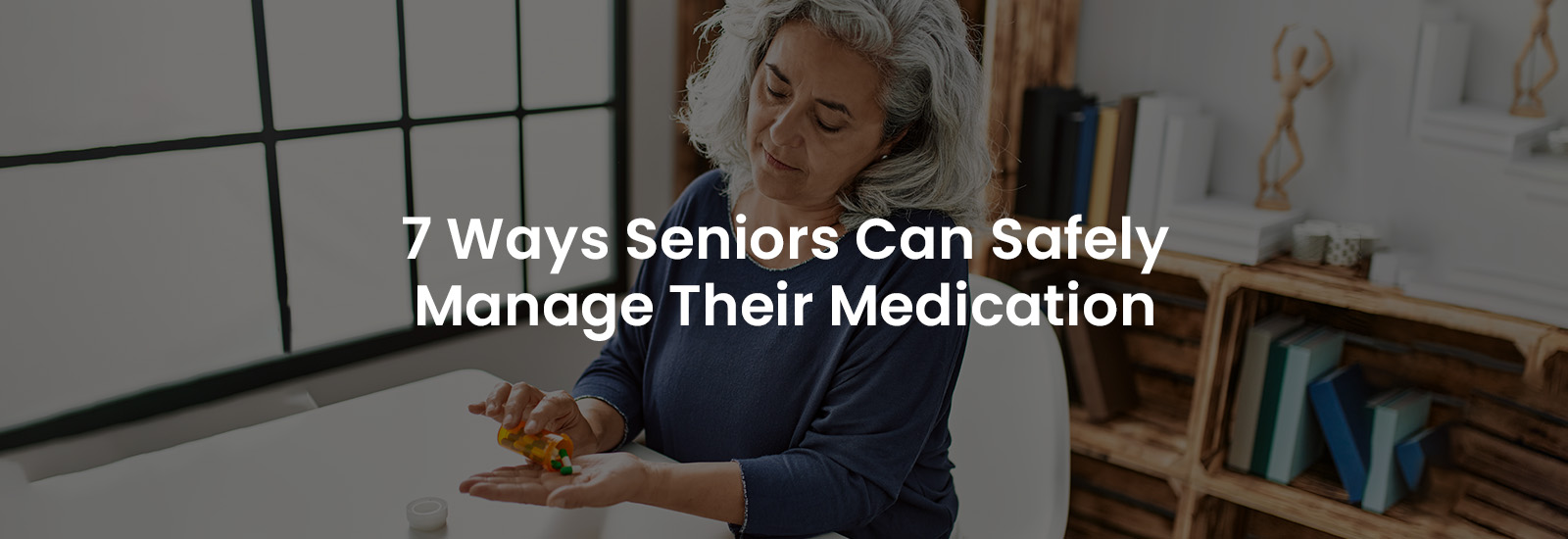
Seniors often take multiple medications and confusing medication dosage, time or frequency can have severe consequences on their health. According to a study published in the Journal of the American Geriatrics Society, approximately 28.7% of hospitalizations among older Americans are due to medication mismanagement. The study also found that older adults with multiple chronic diseases were more likely to be hospitalized due to wrong medication intake. Therefore, seniors and their caregivers need to work closely with healthcare providers to ensure that seniors take their medications correctly and on time.
Why Seniors Should Manage Their Medication Properly
1. Avoid adverse drug reactions
An article published by the National Institutes of Health stated that around 10-20% of hospital admissions among older adults in the United States are because of adverse drug reactions (ADRs). Moreover, the majority of these cases are due to medication mismanagement. It is more common among seniors because they often have multiple medical supplies and hence forget to take their medication or mix the time and dosage.
2. Monitor the effectiveness of medications
In order to manage medication safely, it is crucial to ensure that meds are taken in the correct doses, at the designated time and in the correct way. Furthermore, older adults must have sufficient knowledge about the right way to use and store their medications. They must know when to visit a medical clinic and consult a primary care physician in case of any side effects.
3. Ensure speedy recovery
Seniors suffering from illness or injury should keep an eye on their medication management to recover quickly. As a result, medication can solve health issues efficiently and reduce the risk of complications in the future.
How to Manage Medications

1. Learn the Proper Dosage and Frequency
One of the most significant aspects of managing medications is understanding the proper dosage and frequency. It includes remembering how often to take each medication, as well as how much to take. In addition, note when to take medicine, whether fasting is necessary, etc.
It is wise to follow the instructions on the medication label or ask a primary care physician for guidance. Additionally, dosages may need to be adjusted over time according to their growing age and health conditions. Always remember to keep track of any changes.
2. Get organized
Managing multiple medical supplies for seniors can be overwhelming but organizing them can help. Following are a few simple methods seniors can use to keep their medication organized:
- Create a medication chart: It lists all medications, dosages, and frequency for seniors to keep track of their medications and ensure that they don’t miss any medicine.
- Use a pill organizer: A pill organizer is a container divided into compartments for each day of the week and a specific time of the day (Morning, Noon, Evening, Bedtime). Each compartment is labeled with the day of the week or time of the day and is used to hold the appropriate medication for that specific time.
Suppose a senior is prescribed a medication that needs to be taken every morning with breakfast. The senior would fill the morning compartment of the pill organizer with that medication on Sunday night and take it on Monday morning.
- Set reminders: It is easy to forget to take medication, especially when multiple medications are prescribed. Setting reminders, such as alarms on a phone or calendar, can help ensure that medications are taken on time.
- Review and update the medication chart regularly: Medications and dosages can change over time, so review and update the medication chart regularly as prescribed by their doctors.
- Consider using a mobile app or digital tools: There are apps and digital tools available that can help seniors keep track of their medications and set reminders.
Additionally, keep all of the medications in a safe and easily accessible place, and make sure that caregivers and family members know where the medications are kept.
3. Have a system for refilling prescriptions
Running out of medication can be dangerous, especially when seniors have diabetes or heart disease. Therefore, maintain a system in place for refilling prescriptions. This can include setting up automatic refills or asking a healthcare provider to send a new prescription before the current one runs out.
Additionally, caregivers should contact their healthcare center and keep track of when medications need to be refilled and plan ahead to avoid any gaps in treatment.
4. Check expiration dates
Medications can lose their effectiveness over time, which is why it is critical to check the expiration dates on all medications. To avoid any mix-ups, dispose of expired medications properly and replace them with fresh ones.
5. Read the medication labels
The medication labels are useful to understand proper usage, dosage, side effects, and precautions as they provide vital information about the medication, and instructions for the storage and disposal.
6. Know side effects and interactions
Individuals must be aware of the potential side effects and interactions of every medication they are taking. They should consult the same with their primary care physician and take required precautions. Seniors need to monitor for any signs of adverse reactions and discuss any concerns with a healthcare provider.
Additionally, be aware of any medications that should not be taken together, or the time gaps between two medications to avoid potential side effects.
7. Ask questions
If there are questions or concerns about medications, do not hesitate to ask a healthcare provider. Discussing any potential side effects or interactions, as well as any questions about dosage or frequency is vital to avoid unnecessary health hazards.
Additionally, it is important to make sure that all healthcare providers are aware of all medications that are being taken, especially when multiple doctors are involved. Consult a senior care service and create a medication list and keep track of all prescriptions through a Personal Health Record (PHR) to provide the doctors with required information.
Conclusion
Managing medications can be challenging, especially when multiple medications are prescribed by multiple doctors. Therefore, having a clear and organized system in place is a must for safe medication management. Work closely with healthcare providers to ensure that medications are taken in the right way. For detailed guidance about medication doses, side effects, or drug interactions, contact EliteCare HC, one of the best medical clinics in Florida that offer senior care services.
*Data Retrieved from the Journal of the American Geriatrics Society on medication mismanagement






